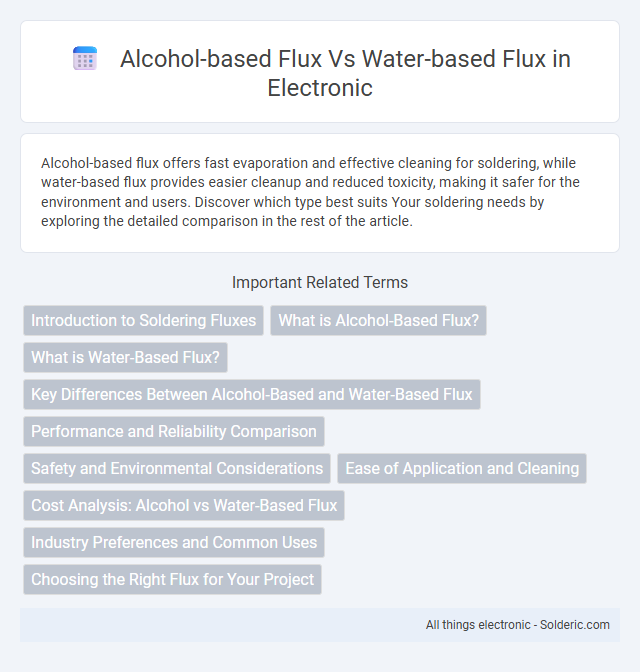Alcohol-based flux offers fast evaporation and effective cleaning for soldering, while water-based flux provides easier cleanup and reduced toxicity, making it safer for the environment and users. Discover which type best suits Your soldering needs by exploring the detailed comparison in the rest of the article.
Comparison Table
| Feature | Alcohol-Based Flux | Water-Based Flux |
|---|---|---|
| Primary Solvent | Alcohol (Isopropyl, Ethanol) | Water |
| Cleaning Method | Evaporates quickly; minimal residue | Requires thorough washing to remove residues |
| Residue Type | Non-corrosive or mildly corrosive residues | Water-soluble residues, can be corrosive if not cleaned |
| Safety | Flammable; requires ventilated area | Non-flammable; safer handling |
| Environmental Impact | Volatile Organic Compounds (VOC) emissions | Lower VOC; environmentally friendly |
| Application | Ideal for quick drying and electronics assembly | Preferred for heavy-duty cleaning and industrial use |
| Cost | Generally higher due to solvents | Cost-effective and readily available |
Introduction to Soldering Fluxes
Alcohol-based fluxes offer rapid evaporation and effective oxidation removal, making them ideal for precision soldering tasks requiring minimal residue. Water-based fluxes provide easier cleanup and are environmentally friendly but may leave more residue that demands thorough washing to prevent corrosion. Your choice depends on the soldering application, with alcohol-based flux favored for electronics due to cleanliness and water-based flux preferred in applications prioritizing safety and eco-friendliness.
What is Alcohol-Based Flux?
Alcohol-based flux is a type of soldering flux primarily composed of alcohol solvents designed to clean and prepare metal surfaces for soldering by removing oxides and contaminants. This flux evaporates quickly, leaving minimal residue, which makes it ideal for electronics and precision soldering tasks where cleanliness is critical. You benefit from improved solder joint quality and reduced corrosion risk when choosing alcohol-based flux over water-based alternatives.
What is Water-Based Flux?
Water-based flux is a cleaning agent used in soldering that primarily consists of water and active organic compounds designed to remove oxides from metal surfaces. Unlike alcohol-based flux, it is less volatile and offers reduced fumes, making it more environmentally friendly and safer for prolonged use. This flux type improves solder joint quality by promoting better wetting and reducing residues that can lead to corrosion or electrical failures.
Key Differences Between Alcohol-Based and Water-Based Flux
Alcohol-based flux contains organic solvents like isopropyl alcohol, offering faster evaporation and leaving minimal residue, which enhances solder joint quality on sensitive electronic components. Water-based flux uses aqueous solutions that are easier to clean and environmentally friendly but may leave more residue, requiring thorough post-solder cleaning to prevent corrosion. Your choice depends on the specific soldering application, balancing residue management with environmental and safety considerations.
Performance and Reliability Comparison
Alcohol-based flux offers superior performance in soldering applications due to its fast evaporation rate and effective residue removal, enhancing joint reliability and minimizing corrosion risks. Water-based flux, while environmentally friendly and safer to handle, tends to leave more residue that requires thorough cleaning to prevent potential conductivity issues and decreased long-term reliability. Selecting flux depends on balancing performance needs with environmental and safety considerations, with alcohol-based flux favored for high-precision electronics and water-based flux suited for less demanding applications.
Safety and Environmental Considerations
Alcohol-based fluxes generally pose higher flammability risks and emit volatile organic compounds (VOCs), making proper ventilation and fire safety measures essential during use. Water-based fluxes offer reduced toxicity and lower environmental impact due to their non-flammable and less volatile nature, facilitating safer disposal and minimal air pollution. Choosing flux types involves balancing effective soldering performance with workplace safety standards and environmental regulations.
Ease of Application and Cleaning
Alcohol-based flux offers excellent ease of application due to its fast-drying properties and strong adhesion, enabling precise soldering with minimal residue. Water-based flux simplifies cleaning since it is designed to be easily washable with water, reducing the need for harsh solvents and manual scrubbing. Your choice between the two should consider whether quicker application or simpler post-soldering cleanup aligns better with your project requirements.
Cost Analysis: Alcohol vs Water-Based Flux
Alcohol-based flux typically incurs higher costs due to the use of volatile organic compounds and stringent handling requirements, whereas water-based flux benefits from lower raw material expenses and reduced environmental compliance costs. The production and disposal of alcohol-based flux demand specialized equipment and safety measures, contributing to increased overall operational expenses. Water-based flux provides a cost-efficient alternative for mass production, balancing performance with budget constraints through simplified logistics and safer storage.
Industry Preferences and Common Uses
Alcohol-based flux is favored in electronics manufacturing due to its rapid evaporation and effective residue removal, making it ideal for precision soldering of delicate components. Water-based flux is commonly used in plumbing and HVAC industries because of its environmentally friendly formulation and ease of cleanup, suitable for larger-scale metal joining. Your choice depends on the specific application requirements, such as component sensitivity and environmental considerations.
Choosing the Right Flux for Your Project
Selecting the right flux depends on the application requirements and material compatibility; alcohol-based flux offers fast drying and excellent solderability for electronics, while water-based flux is eco-friendly and easier to clean but may require longer drying times. Alcohol flux provides strong oxidation removal and residue-free finishes ideal for sensitive components, whereas water flux is less volatile with lower toxicity, suitable for environmental safety needs. Consider factors such as drying speed, residue characteristics, environmental impact, and component sensitivity when choosing between alcohol-based and water-based flux for optimal solder joint quality.
alcohol-based flux vs water-based flux Infographic

 solderic.com
solderic.com